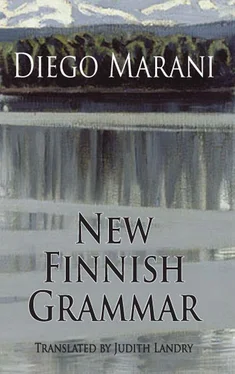The German headquarters were housed in a fenced-in villa with an imposing white gate, set back a little from the street. We crossed the gravel-strewn courtyard embarrassed at the noise of our own steps, to be met by a soldier who, I noticed, walked with a limp. He exchanged a few words with the doctor and led him towards a door at the end of the hallway, gesturing that I should go into the officers’ mess, which was empty at that hour. I sat down and began to leaf through some old magazines. After long minutes spent in silence, I heard his limping step returning, then the door opened and the soldier appeared, beckoning me to follow him. I was escorted into the office, where the doctor and the civil servant were deep in conversation. The civil servant was solidly built, with a red face and a genial smile. He came towards me to shake my hand, gesturing towards an armchair in front of his desk. I sat down, and the doctor, seated beside me, carried on with a conversation which my arrival must have interrupted. He was speaking in German, but I sensed that it was my story he was telling. He pointed to the jacket, which I had taken off and was now holding folded on my knee. At a gesture from the doctor, I pointed to the label, brought the handkerchief with the initials out of a pocket and laid it on the desk. The civil servant turned it over in his hands, frowning, then handed it back to me. The conversation did not last long. The civil servant nodded as the doctor spoke, and took some notes. Then he stood up, took us to the door and bade us a warm goodbye. He also addressed a sentence to me personally in his warm, raucous German; I did not understand it, but sensed it was intended to be well-meant. The doctor, on the other hand, did understand, and shook the civil servant’s hand, giving him a grateful look. I too thanked him, bowing my head in place of words. The lone soldier led us through the gravel-strewn courtyard to the gate. We waited for his limping step to die away before getting into the car.
Now the mist was clearing, rising hazily towards the woods. As we left Opicina flashes of sunlight were already visible over the rocky coast, falling on the sea and dispelling the last strips of cloud. At the first turn in the road the bay came into view, spread out in front of us. The doctor pulled the car to the side of the road; we got out and walked along a stony track running round the side of the hill. Even though the countryside was bright with the fiery colours of the woods, there was a touch of winter in the cold sky. In the deeper dips in the uplands, where patches of cloud still lingered, the trees were already bare. When we reached the top, we sat down on a low stone wall, looking out at the empty horizon and the city below us, set in the dazzling sea.
‘In two days the troop train will be ready,’ the doctor told me. He was gazing into the distance, trying to find words which I could understand. Raising his voice, as though hoping that it would penetrate more deeply into my mind, he went on:
‘The time has come for you to face this journey. You must not be afraid. Basically, this journey is a return. Here you are living in a sort of limbo, a no-man’s-land, your life is in abeyance. Do you understand me?’
I nodded, even though I had barely grasped the meaning of what he said. Looking out to sea again, the doctor went on:
‘You must go back to your past life. Only there can you hope to find something that will jog your memory. Sometimes all it takes is some smell, some trick of the light, some sound that you have heard a thousand times, however unknowingly.’
Smell, light and sound, these had been the instruments of my awakening. The doctor fell silent for a few moments, giving me a conspiratorial look. I did not know what he was thinking, but I sensed that he would have liked to be leaving with me.
‘Now you must start to learn your language. This above all will help you with your memory. The merest breath is enough, if there is still any fire at all beneath the ashes.’
Seeing my blank expression, he repeated what he had just said, miming the lighting of a match, the flame swelling, and rising.
‘You’ll see, it won’t be difficult. But you will have to make an effort. You won’t be able to make do with just a few words and the odd gesture, as we have done these past few weeks. You will have to work hard at your language. Finnish is the language in which you were brought up, the language of the lullaby that sent you to sleep each night. Apart from studying it, you must learn to love it. Think of each word as though it were a magic charm which might open the door to memory. Say each word aloud as though it were a prayer — prayers are made up of words. Turn over its every meaning, its every usage, in your mind.’
I frowned. I could no longer follow what he was saying, but I did not want to interrupt the flow. His words were music, and that music was about me. The doctor saw my difficulty, and tried to describe the more difficult concepts, once more with the help of gestures. Some words he could only uselessly repeat, breaking them down into syllables to show me the pieces one by one. To no avail, the meaning still escaped me; yet, though they dissolved like morning mist, those syllables were not entirely lost. Repeating them to myself I somehow captured traces of them and, much later, those fossil remains yielded up the doctor’s thinking.
The wood around us was rustling with the faint sound of raindrops instantly drunk in by the earth. I felt I could hear the leaves shrivelling, as though all autumn were draining away in a few minutes. The doctor clasped his hands, trying in vain to find some way of communicating his feelings, his advice. Finally he spoke without caring whether I understood or not, in a sudden outburst, giving vent to an evident irritation that his words would simply be borne off on the wind.
‘One more bit of advice,’ he said. ‘I speak now as a man, not as a doctor. Since language is our mother, try and find yourself a woman. It is from a woman that we come into this world, from a mother that we learn to speak. Fall in love, give of yourself. Switch off your brain and follow your heart. You must fall in love with a voice, and with every word you hear it utter.’
Perhaps because it was followed by a long silence, that last phrase, without my understanding it, stayed in my mind. I repeated it, committing it to memory as a frozen block of sounds within which I could discern some meaning. Later, as it dissolved in my mind, I picked the words out of it, the most important last: rakkaus , which means love.
But the glorious landscape laid out before us, the glassy sea, puckered in the distance by the movement of the wind, and the sun, now hot in the still hazy sky, were not conducive to such weighty thoughts. Enchanted by that heartening view, we both fell silent for some time. Even the war seemed far away. From up there the city, so ill-at-ease and anxious, looked like a Christmas crib, and the warships criss-crossing the bay like so many toys. The doctor turned his face to the sun. I stared at the rock at my feet, dropping away steeply into the blue abyss of the sea, and pursued my thoughts. More than his words, which I had barely understood, it was the doctor’s tone which had struck me. I sensed that some moment of truth was approaching, that I was moving towards an appointment I could not fail to keep. I had to solve the puzzle which had cut my life in two. Even if I was by now more or less accustomed to the atmosphere of that unknown city, of that ship anchored outside time, I felt that I could not stay there for ever. The slow-moving smoke from the odd chimney rose from the dazzling city at our feet, together with muffled sounds. As though he were reading my thoughts, the doctor said:
‘And seeing that we are compatriots, when you get there, please send my old Finland my warmest greetings! These weeks of teaching you such little as I could remember of our language has been a voyage of discovery for me too. I have found words which had been forgotten in the cracks in my memory. When I was a child, my mother would often come out with the following saying: ‘ Oma maa mansikka, muu maa mustikk a’ (One’s own land is like a strawberry, other people’s is like a bilberry). Mansikka is the strawberry, red and sweet like our land. Mustikka is the bilberry, black and sour like other people’s. In other words, everyone is best off in their own home. Who knows, perhaps my mother foresaw the fate awaiting me, and those words were a warning. Perhaps meeting you in this way in such a far-flung place is a sign, a message she is sending me from the other world to say that it is time for me too to go back home!’ He gave a crooked smile, perhaps wanting to believe as much himself; he looked at me for a moment, then quickly turned his gaze in a less challenging direction, towards the distant sea.
Читать дальше












